Related Content
Content
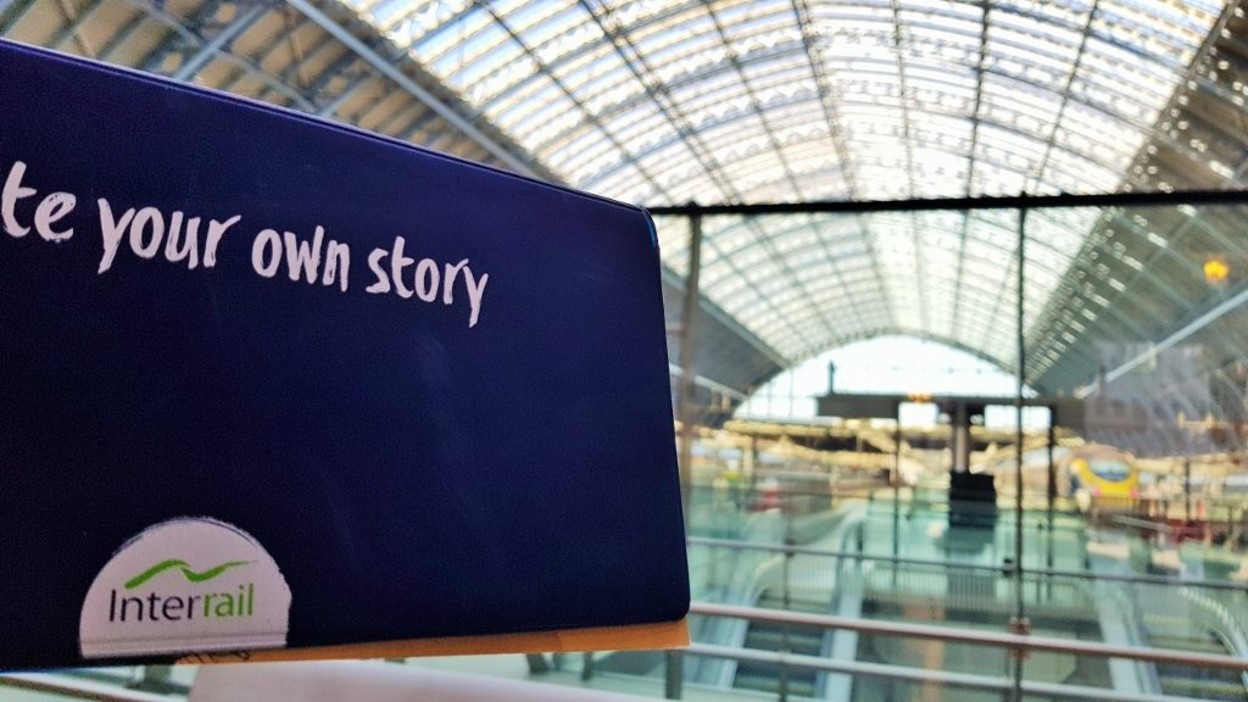
How to use Eurail and InterRail to see Europe by train
A guide to using Eurail or InterRail passes that's packed with info with info and insights gained from using rail passes to travel more than 30,000 kilometers around Europe by train.
Share
Welcome to ShowMeTheJourney's guide to using Eurail and InterRail passes, that comprises info and insights gleaned from using rail passes to travel on 84 days around Europe by train!
So take 10 -15 mins to discover how to save money and be less confused, so that you'll have an easier and hopefully more wonderful rail adventure.
An Introduction to Eurail and InterRail passes:
Eurail and InterRail passes are an alternative to using tickets when travelling on the overwhelming majority of train services in or between these 33 countries:
Austria, Belgium, Boznia- Herzegovina, Bulgaria, Croatia, Czechia/Czech Republic, Denmark, Estonia, France, Finland, Germany, The UK*, Greece, Hungary, Ireland, Italy, Latvia, Lithuania, Luxembourg, Montenegro, North Macedonia, Norway, Poland, Portugal, Romania, Serbia, Slovakia, Slovenia, Spain, Sweden, Switzerland, The Netherlands and Turkey.
*Note that The UK will continue to be a full participant in InterRail and Eurail in 2020 and hopefully beyond, UK citizens will still be able to use InterRail passes in 33 countries and citizens of other countries will still be able to use Eurail and InterRail passes to explore the UK by train.
The key difference between Eurail and InterRail Passes is that to be able to purchase and use an InterRail pass you need to be either a European citizen or a legal resident of a European nation – note that it doesn’t matter whether a particular country is a member of the E.U or not.
Citizens of non-European countries can purchase and use Eurail Passes and ShowMeTheJourney particularly recommends taking a look at this guide to using Eurail passes.
Aside from the fact that European citizens can’t uses passes in the country in which they reside, as they can in a country in which they will be visiting, there is now very little difference between how Eurail and InterRail pass can be used; hence virtually all of the info and suggestions on this guide apply to using both types of pass.
Though a fairly new innovation is that InterRail users can now use their passes in their home countries to travel to and from the border, on the first and last days of using a pass.
In this guide ShowMeTheJourney is going to focus on the less obvious aspects of using these passes.
The best source of the practical information about each pass are the Eurail and InterRail websites; though Seat 61 has an excellent summary here.
Pricing:
The Eurail and InterRail pass prices are now similar too; which has resulted in significant reductions in the cost of Eurail passes in recent years:
- the prices of Eurail passes that can be used in all 33 countries listed above,
- the prices of Eurail passes that can be used in one country or Benelux and Scandinavia,
- the prices of InterRail passes that can be used in all 33 countries listed above.
- the prices of InterRail passes that can be used in one country or Benelux.
ShowMeTheJourney is specifically not listing the prices on this guide, because both Eurail and InterRail offer frequent price promotions, there happens to a sale on right now, with the prices of all InteRail and Eurail passes discounted by 10% if you book before Jan 3rd 2022!
Who can use Eurail and InterRail:
Whenever, I return from a rail pass adventure people will express surprise at my exploits, some wonder why on earth I wanted to do it (ahem), but a more common reaction is "but, you're not a student"?
However, anyone can buy a Eurail or InterRail pass.
Special Eurail Youth and InterRail Youth prices are available for those aged 27 and under; good news if you are 26 or 27, the cut off age for the cheaper youth rate had been 25 until a few years ago.
Those fortunate enough to be aged 60 and over can also purchase passes at a permanently discounted rate!
Though if you will be using a Senior or Youth Pass on a train with mandatory reservations, the reservation charges won’t be discounted.
Children aged 4-11 need their own Eurail and InterRail passes, but they're free! (two children per adult)
Though if you will be travelling on trains on which seat reservations are mandatory, there won’t be any child rates for those reservations.
It takes less than five minutes to buy a pass that suits you; though before you do so, we unsurprisingly recommend taking a look at the suggestions of how to plan a Eurail or InterRail holiday.
The different types of pass explained:
The offering of both Eurail and InterRail passes is based on three factors:
- the number of countries you will be travelling in;
- the number of days you will be travelling by train;
- whether you want to travel in the equivalents of 1st and 2nd class on the trains.
All of Europe or just one country by train:
If you want to travel in multiple countries, you can choose to book a somewhat confusingly named ‘Global’ type of pass and it will be valid in all of those 33 countries listed above; AND on the international trains which travel between them.
OR choose to travel solely within 27 of those countries (there's a pass which covers Benelux = Belgium, The Netherlands and Luxembourg).
The number of travel days:
It’s not possible to purchase bespoke Eurail and InterRail passes specific to ANY number of days you wish to travel by train, but there is a wide choice of set travel periods available; from four days to three months.
15 days or less:
If you want to travel on 15 days or less then the pass will be valid on a specific number of travel days within a set period of time, for example there is a pass that can used to travel on any 10 days within a two month period.
You have total flexibility to choose your dates of travel, you simply write them on the pass - an overnight journey only uses up one day of your allowance.
The other flexible factor with this type of pass, is that within the period of time your pass is valid for, you don't have to use it on all the days/nights when you will be taking a train.
On days which you will be travelling comparatively short distances, it can pay off to buy tickets on those days instead.
You can then save that day your pass is valid for another day of long distance travel.
More than 15 days:
OR if you want to travel on 15 days or more, your pass can be used on ANY number of days, within the period of time that the pass is valid for.
You don’t have to use this type of pass on every day that it is valid, to ensure that is value for money - using a pass valid for 22 days for only 17 days of travel can still pay off.
Also when considering how many travel days you will require, keep in mind the potential for making day trips by train from the locations in which you’ll be staying.
Note that InterRail and Eurail passes are not sold on a per journey basis, a 15 day pass is valid for 15 days of travel and NOT for 15 journeys, the number of journeys you take per day of travel is up to you.
First or Second Class:

Aside from the comfort of the seat and general ambience on the train, these SEVEN other factors are also worth keeping in mind when considering whether to travel in First or Second Class.
(1) Using 1st class passes tends to offer better value for money (see below) against booking tickets, particularly if you will be using a pass valid over a longer period of time .
You can confirm whether a 1st class rail pass will be better value by using the Concierge service.
(2) On trains which don’t have mandatory reservations you’ll be more likely to find spare seats available in 1st class; I have only ever boarded one train with a 1st class pass on which I couldn’t find a seat
(3) If you’ll be making a scenic journey on a train with no mandatory reservations, you’ll be more likely to find a seat on the side of the train, which has the pick of the views.
(4) In France 1st class passes are particularly good value because the reservation fees are the same on the TGV (InOui) trains and the Intercités trains irrespective of whether you have a 1st or 2nd class pass.
(5) Users of 1st class passes now also pay the same reservation fees as users of 2nd class passes on the high speed Thalys trains on the routes those trains take between Paris, Bruxelles, Amterdam and Koln/Cologne
(6) In Italy if you travel with a 1st class pass you pay the same reservation fees as 2nd class pass users to travel on the fabulous Frecce trains.
But a 1st class rail pass reservation entitles you to travel in the enhanced luxury of Business Class; on my two most recent 1st class rail pass journeys in Italy I saved a total of more than €150, compared to the ticket price.
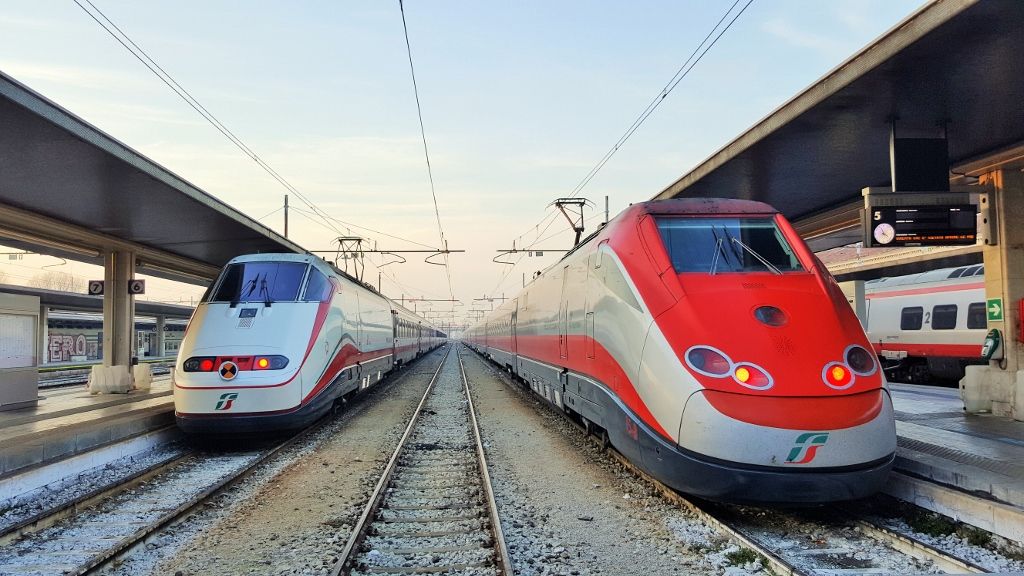
(7) In First Class the provision for storing luggage tends to be more generous; and managing your bags can be the most awkward aspect of pursuing a rail pass adventure.
Will using Eurail or InterRail save money?
At the risk of stating the obvious, whether you will or won’t save, depends on how use your pass - and now that Eurail prices have been significantly reduced since 2019, you'll also be more likely to save with a Eurail pass too!
So be wary of articles and comments with a subject of ‘I travelled to these 5 cities and I could have saved €100 if I’d bought tickets for each of my five journeys instead’.
It will be correct, but it’s possible that the author could have saved money, if they had travelled to 5 other more distant destinations
These SIX factors come into play in the value for money equation.
1. How far you will be travelling:
What matters in particular is the average distance you will be travelling, on each day you use your pass, if you will be only taking one or two trips of five hours or more, it's less likely that Eurail / InterRail will be good value.
2. How long your pass is valid for:
The longer the period of time your pass is valid for, the less distance you have to travel per day, on average, for a pass to become value for money.
This distance and time equation is explored in more detail on the itinerary planning guide.
3. When you will be travelling:
Most European express train operators apply airline style pricing, meaning that train ticket prices will be more expensive at times of high demand.
Those very cheapest tickets might not be placed on sale at all on trains that are likely to be popular.
But these typically more expensive travel periods, such as the summer and festive holidays, will also coincide with when you’ll be most likely to be using a pass.
An often overlooked plus of rail passes is that the prices aren't seasonal, so they don’t rise in the summer, during school holidays, over Easter etc.
4. Where you will be travelling:
Train travel costs are cheaper in Eastern Europe, so rail passes are less likely to save you money if your trip MAINLY involves travelling through countries such as Bulgaria, Czechia, Hungary, Poland and Romania.
Though conversely if you use your pass on comparatively expensive journeys, such as some Swiss mountain railways, on which Eurail and InterRail passes can travel for free; then that can help tip the balance towards a rail pass being good value for money.
5. How far ahead that you’ll be booking a pass:
European train operators tend to offer limited numbers of heavily discounted tickets for journeys by long distance express day and night trains, INCLUDING all high speed trains and all international express trains.
These bargain-priced tickets will be placed on sale 1 – 6 months ahead of the travel date, with 3 -4 months being most typical.
So if such tickets are still available when you’re planning your journeys and considering whether a pass is a good deal, it’s less likely that a rail pass will save you money - though you will know for sure whether a pass will be the cheaper option if you make use of the Concierge Service.
Though keep in mind that the greater the ticket price saving, then the less flexible the terms of using the ticket will be – discounted tickets can only ever be used on the specific train departure you select when booking.
Unless you take out bespoke travel insurance, you will be out of pocket if you miss such a train because of illness, a flight delay, not being at the station on time etc.
Before you commit to a pass, work out the COST PER DAY of using it and then look up the prices of some of the journeys you’re considering, by using the ticket booking links on our journey guides.
Check the advance ticket prices for when you’re thinking of making the journey AND the prices only a few days ahead - or ask the Concierge Service to do this for you.
If you’ll be travelling far enough per day, it’s almost certain that a rail pass will enable you to make big savings compared to the cost of purchasing last minute tickets.
6. The trains you travel by (seat reservations):
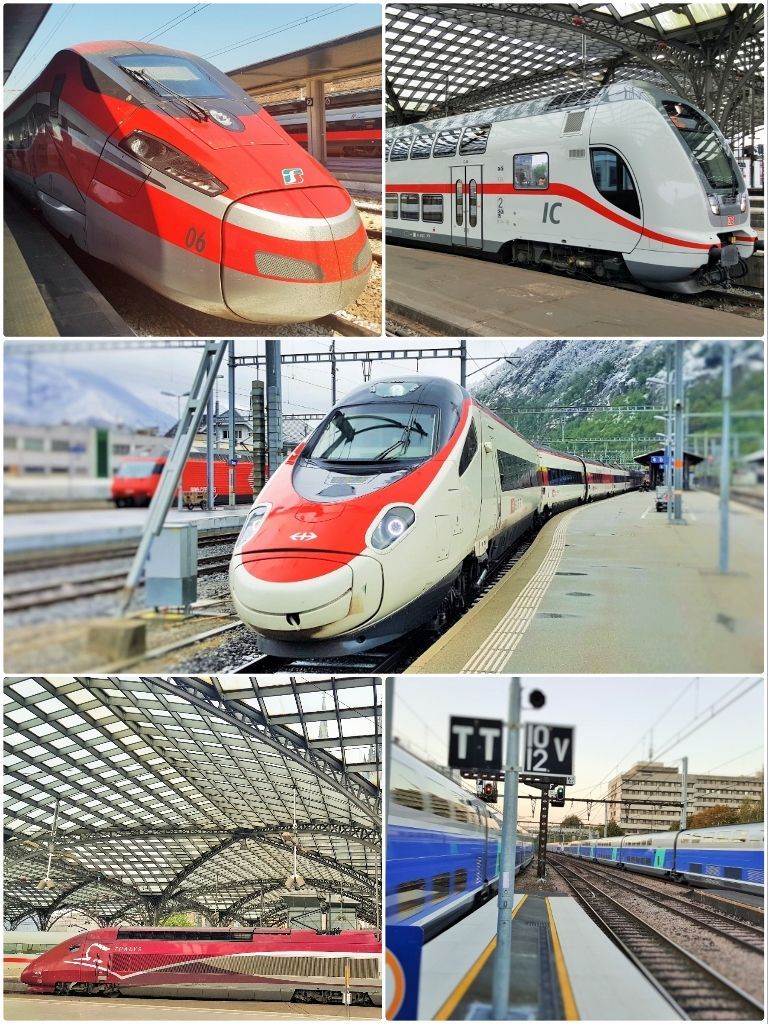
The type of daytime train service you will travelling by matters when using Eurail and InterRail passes.
Those who have booked tickets on some European express train services will receive a complimentary seat reservation.
The train operators can’t then risk rail pass users sitting in those seats, so you need an assigned seat too, on a train that will be fast and fabulous.
Hence rail pass users have to pay a fee for these seat reservations; and guaranteeing a seat will also go a long way to ensuring a long journey will be pleasurable.
Take a look at our reservations guide to using your Eurail and InterRail pass, so you can see at a glance when you do have to reserve AND when you don’t.
What you’ll see is that these mandatory DAY train reservations will typically cost €3 - €10.
The prices for these reservations that we feature on ShowMeTheJourney, deliberately don’t include the booking fees, because as pointed out here more often than not, it’s possible to avoid paying these additional booking charges.
Travelling long distance by such trains can be good value for money; the daily cost of using a pass + the reservation fee can be more than 60% less than the cost of last-minute tickets.
Though on a few international high speed services, including these services to and from France; TGV -Lyria, Thalys, DB-SNCF, RENFE-SNCF and TGV France/Italy - the particularly expensive rail pass reservation fees do mean that rail pass users seeking value for money, should avoid those trains.
Here are some alternative journey options which avoid taking trains with particularly expensive rail pass reservation fees.
But you can still use a pass to take those slower and therefore cheaper trains and make an overall saving, compared to buying tickets for your overall itinerary; it depends how far you will be travelling and what trains you will be taking on your OTHER travel days.
Though you will be less likely to save if you mainly want to travel around Europe in the sleeping cabins on overnight trains.
That’s because rail passes only include the full or discounted journey costs on any overnight train and NOT the reservation charges for a bed in a sleeping cabin or a bunk in a couchette; and those journey costs can be a small percentage of the total cost, when travelling in a sleeping cabin or couchette.

Some cost comparisons when using 10 day passes:
ShowMeTheJournney has put together six rail pass itineraries ('Direct Trains' has two itineraries) for Eurail and InterRail passes valid for 10 DAYS and to be honest, aside from the itinerary based on paying no additional reservation fees, the cost consideration wasn’t a primary factor.
Instead the focus was on the destinations and making the train journeys between them as easy or as spectacular as possible.
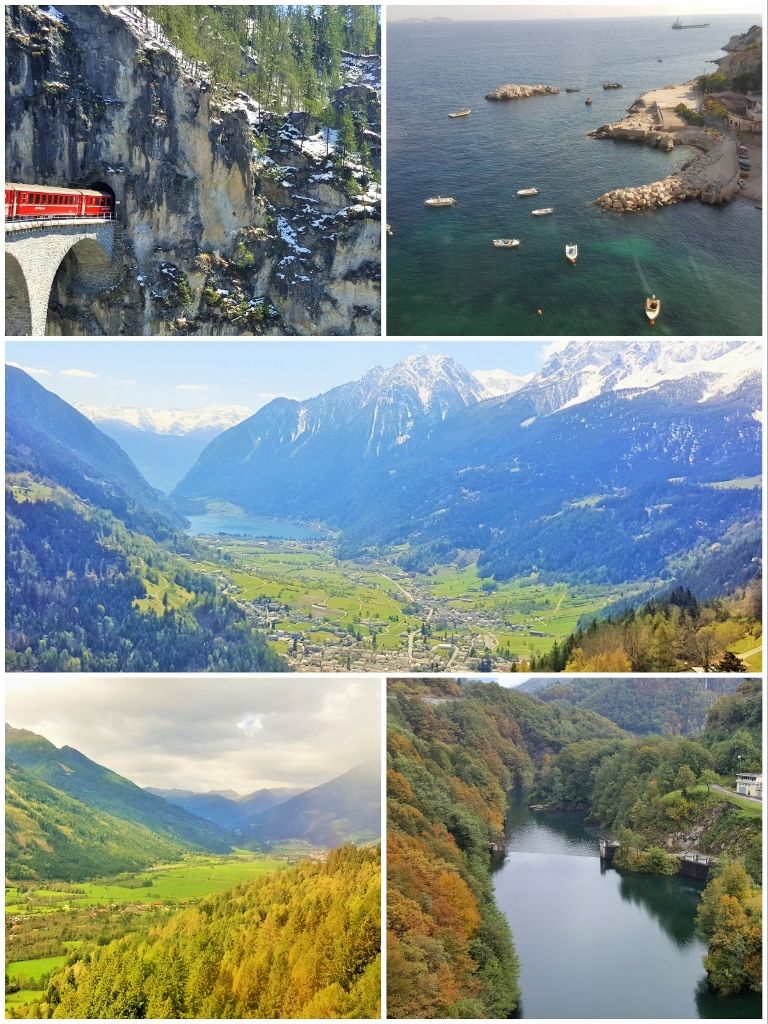
Each journey on those itineraries was then looked up to check the cheapest possible adult ticket price that could be found for sale - AND the price if an adult was to book those journeys a couple of days ahead
Then these were compared with the total rail pass costs of taking each itinerary = the standard non-sale price of the pass + the reservation fees for the trains we included (+ the costs of taking some additional journeys not covered by a rail pass).
On AVERAGE over the six itineraries:
Compared to booking the cheaper discounted tickets, the types of rail pass valid for 10 days were:
- 1st Class Adult = 10% cheaper
- 2nd Class Adult = 11% more expensive
- 1st Class Youth = 27% cheaper
- 2nd Class Youth = 9% cheaper
Compared to booking tickets only a couple of days ahead, the types of rail pass valid for 10 days were:
- 1st Class Adult = 43% cheaper
- 2nd Class Adult = 37% cheaper
- 1st Class Youth = 54% cheaper
- 2nd Class Youth = 50% cheaper
(Adult passes are the passes that can be purchased by 28 – 59 year olds, Youth Passes can be used by those aged 12 - 27).
Arguably not the most comprehensive of surveys, but IF you’ll be travelling for 10 days, the four broad conclusions are evidently;
(1) If you are 28-59 and want to travel 2nd class AND are able to track down the cheapest tickets AND are prepared not to be able to change your travel plans - you’ll usually make a saving by booking tickets instead of a rail pass.
Though a pass will definitely save you money if you follow this itinerary.
(2) If you meet the Youth Pass criteria, you will likely save money regardless.
(3) 1st class InterRail and Eurail passes are particularly good value for money if you meet the Youth Pass criteria.
(4) If you book a rail pass only a couple of days ahead of your travel dates, you WILL be making a substantial saving.
Not yet convinced? Well SMTJ has some further money saving tips.
Other good reasons for using rail passes:
Whether travelling with Eurail or InterRail passes will save money against the ticket costs, isn't the only factor worth considering when deciding whether rail passes are the best option for your trip.
I once opted for a 5 day Inter Rail pass when it was €30 more than the costs of the tickets, because I decided that the other benefits of using the pass, meant that it was still value for money.
1. Using passes can be a time saver:
There are multiple instances in which using rail passes will save you time and I'm not talking about using trains that are faster than others.
Before you set off:
So you’ve worked out that you can save money by booking separate tickets per journey, you’ve even discovered this fantastic website (ahem), which directs you to all the optimum websites on which you can book ticket(s) for each journey – without paying a booking fee!
But now you have to look up all your journeys up to make the bookings – which will take a while, particularly if you want to hunt down those best deals.
The point being that it will take a lot longer to look up and buy separate tickets than it would to buy a rail pass online.
It takes less than five minutes to buy a pass that suits you – though before you do so, we unsurprisingly recommend taking a look at our rail pass holiday planning guide.
At the station:
There is a counter-argument that if you’ve booked in advance for a ticket to travel by a train on which rail pass users have to reserve, then at the station you can breeze pass the Eurail or InterRail pass users, queuing at the ticket counters to make their reservations.
Trust me, this will be the exception rather than the rule, in fact I’ve only spent more than 15 mins in a queue to book a rail pass reservation twice (in Bern and Milan for EC trains between Switzerland and Italy).
See SMTJ's advice HERE for how you can also minimize the time you’ll take to book your rail pass reservation fees.
And when you’re using an InterRail or Eurail pass to hop around multiple places per day in smaller countries such as Austria, Belgium, Denmark, Luxembourg, Switzerland or The Netherlands – my favourite method of putting a rail pass to good use, the reverse scenario is true.
You’ll be the ones breezing on to the trains, while those without passes are in the travel desk queue, or trying to figure out the ticket machines.
2. The scope for spontaneity:
Arguably the biggest tick in the box for using a rail pass isn’t whether it will or won’t save you money, it's the freedom to undertake spontaneous journeys - to take that longer, but more beautiful route because the sun is shining etc,

Even when I’ve worked out that buying separate tickets will have been cheaper, I’ve still opted for a pass, in order to have some flexibility over a choice of route and selecting departures.
Because some of the most prestigious European daytime trains and all overnight trains, require reservations before boarding, there is now a school of thought that the care-free spirit of adventure, which used to be synonymous with rail passes, has been diminished.
It's also true that travelling by express trains in certain countries isn't compatible with spontaneity, in France you'll save by booking reservations in advance and in Spain, the trains can be particularly prone to selling out.
However, with an InterRail or Eurail pass you can still hop on and off virtually ANY domestic train in Austria, Belgium, Denmark, Germany, Great Britain, Ireland, Luxembourg, Norway, Switzerland and The Netherlands.
And if you will be travelling on a route, on which the trains that require reservations are departing fairly FREQUENTLY, you can book your reservations last minute at the station.
For example rail pass reservations are required on all Italian express trains, but they don’t cost any more if you book last minute, you can even buy them from Trenitalia’s ticket machines.
If you don't want to bother with making reservations, alternative, slower trains and routes are often an option - particularly in Italy
Having taken more than 350 European trains with a 1st class rail pass I've only ever encountered one sold out train on a route with fairly frequent trains, but it wasn't the end of the world, I had to take an alternative train departing two hours later.
Though being entirely spontaneous isn't recommended, one of my 'golden rules' is to always book at least a couple of days ahead on routes in western Europe, with three or less trains per day.
3. They can make train travel easier:
Aside from the scope to enhance your adventures by choosing beautiful journeys and destinations, there are THREE often overlooked practical considerations for using Eurail and InterRail passes that can make your travels more pleasurable.
(1) If you opt for booking discounted tickets, they will be train departure specific, and it will be your responsibility to be at the station on time.
Having to reach a station against the clock time and time again, in cities you don't know that well, isn’t fun when you are supposed to be on holiday.
But if you have a rail pass and will be taking a route with frequent trains, you can often simply turn up at the station when it suits you.

(2) The opportunities to take alternative trains can be a big plus when the trains aren't running smoothly on your travel dates.
I have arrived at stations to discover that trains are being delayed due to technical problems on a route.
Because discounted tickets are only valid on specific trains, the travellers with such tickets were usually having to wait, until the train they were booked on to departed at its revised time.
But with a rail pass, I've been able hop on the next train that's leaving, or make a last minute reservation on a train that hasn't been delayed, or even taken an alternative route avoiding the disruption.
(3) Using tickets for long end-to-end journeys with more than one change of train can have complications in the event of a train delay leading to missed connections, but with a rail pass you can de-risk taking such journeys.
If you have reservations on the train you are connecting into it, it’s likely that you’ll be able to swap them to a later departure.
In a worst case scenario, you might have to book a new reservation, but that will cost a lot less than having to re-purchase a train ticket.
Also the ticket agents nearly always assume that travellers taking long routes requiring connections will always want to reach their destinations in the fastest possible time, but with a rail pass you can choose your own trains and avoid making connections connections against the clock.
Travelling with Eurail and InterRail makes it so much easier to have more time at a station, so that you can have a meal between trains, or even dump your bags in left-luggage and set off for a few hours exploring between trains.
Changes since 2019:
The usual (non-discounted) prices of Eurail and InterRail passes have, give or take a euro or two, remained the same in 2020; the costs of following most of the ready-made suggested itineraries have fallen in price in 2020.
Changes to rail pass reservation fees
The prices of the reservation fees which Eurail and InterRail pass users have to pay on certain trains also largely remain unchanged, EXCEPT for three notable exceptions:
(1) The EC trains on the Munchen - Innsbruck - Bolzano - Verona - Bologna/Venezia route have joined the group of train services with comparatively expensive fees, because the price of the reservations to travel over the Austria <> Italy border have increased by more than 40% to 1st class = €20.90 and 2nd Class = €14.50.
(2) Rail pass users don't usually have to pay mandatory reservation fees to travel on the superb Railjet trains, even when making international journeys, but reservation fees of €15 in 1st class and €10 in 2nd class have now been introduced on the Austria <> Italy route.
(3) First and Second Class pass users now pay the same fess for journeys by Thalys high speed trains on routes which link Paris and Brussels to Amsterdam and Cologne.
Users of Second Class passes will have to travel in Standard Class on the Thalys trains.
In contrast First Class pass users will be offered a choice of seating, depending on availability at the time of booking.
If Premium Class is still available then that will be offered, if reservations are sold out in Premium Class you will be offered Comfort Class (1st class), but if Comfort Class is sold out and Standard Class reservations are still available, you will only be offered seats in Standard Class.
The new fees (in either direction) are:
Paris <> Bruxelles/Antwerp/Liege = €25
Paris<> Aachen/Koln/Dusseldorf/Essen = €30*
Paris <> Rotterdam/Schiphol/Amsterdam= €30*
Bruxelles/Antwerpen <> Rottterdam/Schiphol/Amsterdam = €20
Bruxelles/Liege <> Aachen/Koln/Dusseldorf/Essen = €25
*First Class reservations on these routes had been €35.
Most relevant changes to train schedules
There have been an exceptionally high number of major changes to European train timetables in 2020.
Those that will likely be of most relevance to rail pass users are:
(1) From Apr 30th there will be direct Eurostar trains from Amsterdam to London - on which rail pass users can pay reservation fees.
(2) Overnight Nightjet trains are now operating on two nights per week in both directions between Bruxelles and both Wien/Vienna via Linz AND Innsbruck via Munchen/Munich.
(3) Krakow has a new direct overnight rail link with Berlin, it's not particularly useful when travelling to Poland, but when heading to the German capital, the train will leave Krakow just after midnight
(4) More regional trains are now travelling between France and Spain on the Mediterranean Coast route via Port Bou <> Cerbere, so there are now more options for avoiding the particularly expensive reservation fees on the RENFE-SNCF services on the high speed line.
(5) It's now become easier to travel between Oslo and both southern Sweden and Denmark, because there are more trains on the Goteborg/Gothenburg <> Oslo route.
It's also now feasible to stop over in Goteborg/Gothenburg when heading by train to Bergen.
(6) Looking ahead to the summer, the seasonal overnight train from Bucharest to Sofia/Istanbul (and Thessaloniki) will have a new departure time of 11:00.
This breaks what had been a tightly timed connection, with an overnight train from Budapest, so it looks as though a Budapest > Sofia/Istanbul journey will now incur an overnight stopover in Bucharest.
(7) There are now much more frequent regional trains between Milano and Erstfeld in central Switzerland.
This is good news for rail pass users as there are now more options for avoiding the reservation fees on the Switzerland <> Italy EC trains.
Those regional trains also take a more spectacular route!
(8) Now that rail pass can be used on the Thello trains a welcome development is that the direct trains in both directions between Marseille and Milano now operate daily and at more convenient departure times.
The 2019 changes to availability and prices
A major new development which occurred back in 2019 is that Eurail passes availability and prices now more closely resemble those of InterRail passes.
As a result there were two highly welcome key changes:
(1)The standard (non sale) prices of many Eurail passes were significantly reduced.
(2) Eurail Global Passes can now be used in additional countries, bringing the total to 33 - and they are Great Britain, Lithuania and Macedonia(and now Estonia and Latvia)
New Types of Pass Introduced:
Two new types of multi-country 'Global' Eurail and InterRail passes became available:
(1) a pass that's valid for 2 months of continuous travel;
(2) a pass that's valid for 3 months of continuous travel.
Also the passes which allow for 10 or 15 days of flexi-travel, on which the user can specify their dates of travel, are now valid for 2 months instead of a month.
And the type of flexi-passes which allow for 5 days of travel are now valid for one month, instead of 15 days.
Travelling on night trains:
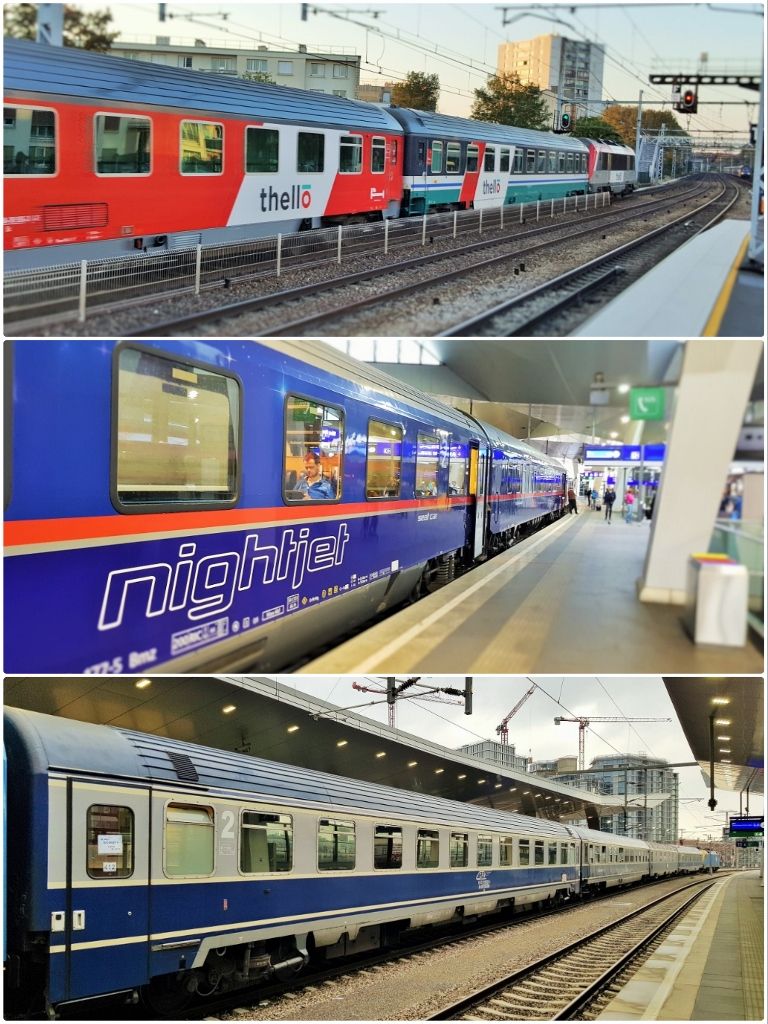
The other particularly welcome news in 2019 was that that how both Eurail and InterRail passes can be used on overnight trains has been made simpler.
The key take-away from this is that if you travel on any overnight train, it only uses one day of your travel pass allowance and not two - you only have to enter your arrival date on the pass.
Particularly welcome news if you're interested in the types of flexi- pass that are valid for a set number of travel days
Previously this only applied to journeys which commenced after 7pm - it was known as the '7pm rule'.
Other changes in recent years:
Previously decided against using a Eurail or InterRail pass? Well here are some FOUR key benefits of using these passes that have been introduced fairly recently.
(1) Eurail and InterRail pass now allow 'free' travel on MGB trains in Switzerland - very welcome if you want to travel across southern Switzerland.
(2) Linked to this is that Eurail and InterRail pass users now only have to pay the reservation fees on the fabulous Glacier Express - a saving of around 65% on total ticket prices!
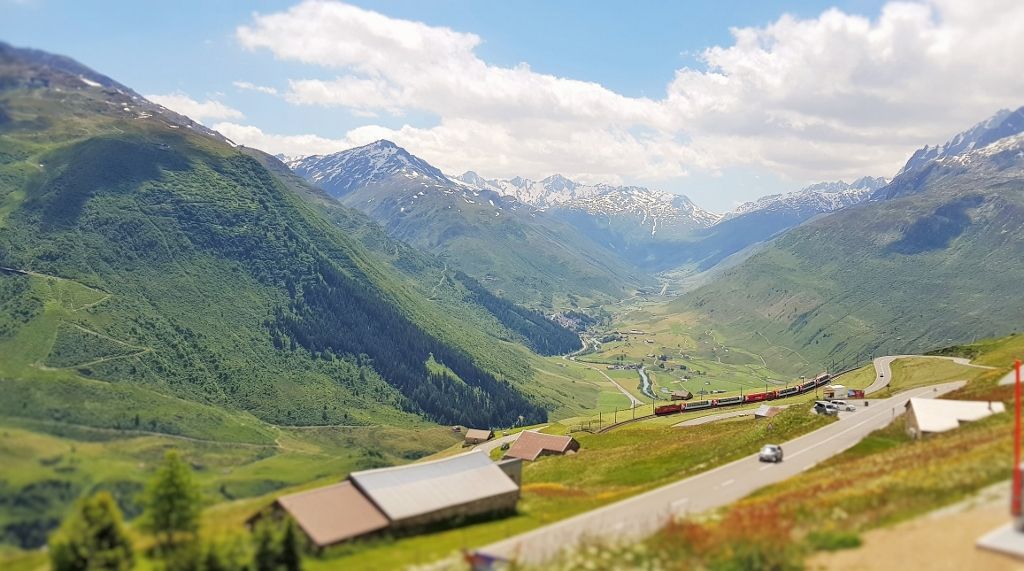
(3) Similarly Eurail and InterRail pass users can travel on The Bernina Express by only paying the reservation fees.
(4) Flat rate rail pass reservations fees are now available on Eurostar trains; 2nd class = €30/38; 1st class = €38/43, this is usually cheaper than buying discounted tickets and can be 4 x less expensive than full price tickets
Alternatives to using Eurail and InterRail passes:
The other relevant travel guides:

Simon Harper
I wanted to share my passion for train travel and explain how anyone can take the fantastic journeys I have taken.

This is one of more than 100 train travel guides available on ShowMeTheJourney, which will make it easier to take the train journeys you want or need to make. As always, all images were captured on trips taken by ShowMeTheJourney.


















